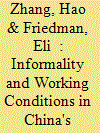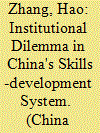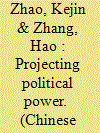|
|
|
Sort Order |
|
|
|
Items / Page
|
|
|
|
|
|
|
| Srl | Item |
| 1 |
ID:
166432


|
|
|
|
|
| Summary/Abstract |
This article examines China's Electric Power Law and the recent policies governing China's electricity sector from the energy-climate-environment dimension. Using the fragmented authoritarianism framework, it captures the legal system that is still rooted in the pre-reform era, and the antinomic policy making that is driven by the policy imperative to accommodate the shifting pattern of energy supply, the growing awareness over climate mitigation and environmental protection. By examining the most recent policy imperatives on regulating new investment and efficiency, and pricing deregulation, this article focuses on changes in the policy arena and their impacts on the regulatory governance of China's electricity sector. Using the methodology of qualitative study, this article critically investigates these policy changes that generate incompatible regulatory concerns. The incompatibility creates competing regulatory concerns over energy-climate-environment in the policy making process, and generates discord between China's central and provincial governments. Dealing with the challenges will depend on developing a legal framework for China's electricity sector. Findings of this article echoes with energy law scholars’ point of view that energy law has a much bigger role to play to balance different or competing policy agendas to deliver better energy policy that delivers the expected outcomes for society.
|
|
|
|
|
|
|
|
|
|
|
|
|
|
|
|
| 2 |
ID:
166872


|
|
|
|
|
| Summary/Abstract |
Drawing on ethnographic data from the sanitation industry in Wenzhou and Guangzhou, we investigate different patterns of work organization in each city. We find that supplementary informal work can serve to subsidize low family income and therefore stabilize formal but exploitative work. In Wenzhou, the family team model creates time and space for one spouse to engage in informal work while still receiving a wage from the employer. This additional informal work significantly increases net family income, which neutralizes worker demands for better wages and working conditions in the formal sector. In contrast, Guangzhou workers are subject to relatively rigid spatio-temporal controls, impeding them from participating in informal work to supplement their formal wages. Despite receiving higher wages and more benefits, these workers are highly wage dependent and express much greater discontent than their equivalents in Wenzhou. Theoretically, we contribute to the literature on informality through a discussion of “ancillary informal work,” highlighting how access to certain kinds of informal work both subsidizes and is facilitated by formal sector employment.
|
|
|
|
|
|
|
|
|
|
|
|
|
|
|
|
| 3 |
ID:
183238


|
|
|
|
|
| Summary/Abstract |
The Chinese government has placed workforce upskilling at the core of its reform agenda to sustain the Chinese “economic miracle.” As such, the Ministry of Human Resources and Social Security (MOHRSS) and Ministry of Education (MOE) have each launched separate apprenticeship reforms geared towards enhancing China's oft-criticized vocational education and training system. Using a self-constructed theoretical framework, this article examines the two reforms and ascribes their divergent outcomes to the two ministries’ distinct approaches to institutionalizing their central initiatives (i.e. the top-down model followed by the MOHRSS versus the collaborative model of the MOE). However, given the absence of industry-level civil society governance in China, neither of these models has delivered ideal training outcomes, although the collaborative model has satisfied more employers and apprentices. China's skills-development reforms have thus become trapped in an institutional dilemma which is likely to impede the long-term economic restructuring efforts of the central state.
|
|
|
|
|
|
|
|
|
|
|
|
|
|
|
|
| 4 |
ID:
167322


|
|
|
|
|
| Summary/Abstract |
Policy communities throughout the world tend to agree that in recent years China has become more assertive in its maritime disputes with neighbouring countries. However, scholars vehemently disagree about the underlying motivations for such a change, whether structural factors, China’s external pressures, or growing overseas interests. This article argues that existing analysis runs the risk of dismissing the embedded logic of domestic legitimacy as the single most important explanation. China’s maritime strategy has almost always served the goal of legitimisation in consistence with the Party’s central enterprises, be they survival, modernisation, or political influence/power. The rise of naval nationalism from within has pushed the central leadership to respond with determination for the sake of maintaining credibility as ‘national saviour and protector’. More importantly, in view of the bureaucratic fragmentation in China’s maritime governance, new policy actors can forward their own interests by appealing to nationalist sentiments, and to the Party’s new central task of projecting political power. Our case studies on Sansha City, the Diaoyu/Senkaku Islands, and the Haiyang Shiyou 981 Drilling Rig bring in supportive evidence. Specifically, they demonstrate that all extant explanations may indeed influence China’s maritime strategy, but mostly through their impact on domestic legitimacy. Based on our legitimacy thesis, it can be predicted that, if the central leadership manages to consolidate its domestic legitimacy, China will assume a more moderate, cooperative, and constructive attitude towards maritime disputes.
|
|
|
|
|
|
|
|
|
|
|
|
|
|
|
|
| 5 |
ID:
127300


|
|
|
|
|
| Publication |
2014.
|
| Summary/Abstract |
This paper analyzes the long-term relationships between hydropower generation and climate factors (precipitation), hydropower generation capacity (installed capacity of hydropower station) to quantify the vulnerability of renewable energy production in China for the case of hydropower generation. Furthermore, this study applies Grey forecasting model to forecast precipitation in different provinces, and then sets up different scenarios for precipitation based on the IPCC Special Report on Emission Scenarios and results from PRECIS (Providing Regional Climate projections for Impacts Studies) model. The most important result found in this research is the increasing hydropower vulnerability of the poorest regions and the main hydropower generation provinces of China to climate change. Other main empirical results reveal that the impacts of climate change on the supply of hydropower generation in China will be noteworthy for the society. Different scenarios have different effects on hydropower generation, of which A2 scenario (pessimistic, high emission) has the largest. Meanwhile, the impacts of climate change on hydropower generation of every province are distinctly different, of which the Southwest part has the higher vulnerability than the average level while the central part lower.
|
|
|
|
|
|
|
|
|
|
|
|
|
|
|
|
|
|
|
|
|